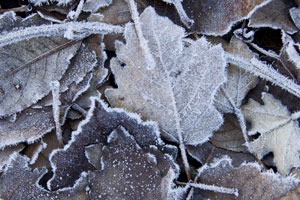As the calendar marches toward late fall and early winter, differences in regional growing conditions become much more pronounced. Some zones are covered in snow, while others are just starting to harvest. In all but the warmest zones, the list of seasonal gardening chores is starting to get short for most gardeners.
That's welcome relief for most of us, because with Halloween just behind us, another busy holiday season is just around the corner. Before you find yourself knee-deep in cold, snow or holiday preparations, here is a helpful list of gardening tasks for the month of November.
Tasks For All Zones:
- Rake and compost leaves (or turn them under). Clean up garden debris to prevent harmful insects or disease pathogens from spending the winter in the garden.
- Keep up on weeding.
- Add organic compost to garden beds and amend soil as needed.
- Clean, oil, and sharpen garden tools and make a list of what needs to be repaired or replaced.
- Start the clock for forcing indoor bulbs for the holidays (paper whites, amaryllis, hyacinth, etc).
- Gather berry-laden branches and interesting winter foliage to use for holiday decorating.
- Change outdoor planters, pots, and window boxes to seasonal displays.
- Cover compost heaps to prevent nutrients from leeching out due to rain or snow.
- Mist houseplants as needed to protect from dry winter air.
Tasks for the "Coldest" Zones (Zones 6 and Below):
- Continue to water trees and shrubs as needed until the ground freezes.
- Provide winter protection for rose bushes.
- Add additional protective mulch as needed.
- Bleed outdoor faucets and drain and store garden hoses for the winter.
- Mow the lawn for a final time and clean and drain fluids from the lawn mower before storing for winter.
- Don't forget to mark spring bulb plantings.
- Finish winterizing outdoor water features and swimming pools.
- Pot up spring bulbs (tulips daffodils, crocus) for late winter forcing indoors.
- Fill bird feeders and transition to heated birdbaths
- Wrap trees to protect against rodent damage.
Tasks for the "Middle" Zones (Zones 7, 8 and 9):
- Keep an eye out for frost warnings. Use row covers and cold frames as necessary to extend the season.
- Continue planting bareroot trees and shrubs.
- Finish planting spring bulbs.
- Divide and transplant perennials.
- Finish harvesting vegetables and clean up garden beds.
- Continue to mow the lawn until it goes dormant.
- Watch for insect pests.
Tasks for the "Warmest" Zones (Zones 10 and 11):
Although zone 10 and 11 are considered "warm," each zone varies considerably in individual growing conditions. For the most part, Zone 10 is virtually free of chilly winter frosts. It is influenced heavily by ocean breezes and is considered a sub-tropical zone. Zone 11, on the other hand, is considered the tropical zone and enjoys a year-round growing season.
- Plant tender bulbs.
- Replace spent annuals with cool season plants.
- Divide and transplant perennials.
- Plant cool season vegetables, perennial herbs, and sow seeds for succession plantings.
- Sow wildflower seeds now.
- Prune flowering trees after blossoms fall.
- Watch for seasonal insect pests.

